- Home
- Don DeLillo
The Silence Page 5
The Silence Read online
Page 5
He tells himself that it’s time to head home and that he will have to muscle his way through the crowd, people hunched against the cold, a thousand faces every minute, people wrestling, throwing punches, a small riot here and there, curses rising into the air. He stands for a few seconds longer, flexing shoulders in preparation, and decides that when he gets to his building he will count the steps as he climbs to the apartment. He has done this before but not for many decades and begins to wonder what the point is.
Then he walks into the streaming mass.
* * *
Diane, back home, where else, is trying to suppress a series of little squeaky belches.
She says, “Somewhere in Chile.”
This seems to mean something but she can’t remember what it is. She looks at Martin and then at the other two, returning from the bedroom. The man is yawning and the woman is almost fully dressed, wearing low-cut socks but no shoes. Diane mutters a few foul words, mocking herself for yielding to the spirit of the moment and allowing the bedroom to be used by sex-frenzied guests.
Or maybe they were just resting. This is what they’d said, this is what she’d originally believed.
Martin says, “The Cerro-Pachón Ridge in north-central Chile.”
“What’s that?” Jim says.
“The Large Synoptic Survey Telescope.”
He goes on to explain the matter and then Max walks in and unzips his jacket. They wait for him to say something. He takes off the jacket and tosses it on the floor next to the remote control device, his bottle of bourbon and his empty glass. He fills the glass and drinks, shaking his head at the bracing shock of raw whiskey.
What is happening in the streets? What is out there? Who is out there?
He says, “You don’t want to know.”
Then he raises his glass.
“Widow Jane,” he says. “Aged ten years in American oak. Did I say this before?”
He drinks and then leans forward and to his left, looking at Tessa’s feet.
“What happened to your shoes?”
“They walked off without me,” she says.
Everybody feels better now.
* * *
Martin is not finished. He says, “The onward moments, the flowing moments. People have to keep telling themselves that they’re still alive.”
Jim Kripps listens to himself breathe. Then he touches the bandage on his forehead, just checking, confirming that it’s still there.
Two of the others are barely awake, Tessa and Max. Diane understands that she is here to listen to her former student as he had once listened to her.
“When we’re finished with all this, it may be time for me to embrace a free death. Freitod,” he says. “But am I serious about this or simply begging attention? And the situation we are in. Shouldn’t I be home, alone, in my room? Isn’t this what the circumstances warrant? No word from anyone, anywhere. Time to sit and be still.”
He touches the edges of his chair, confirming the fact that he is seated.
“Or am I being a little too self-important?” he says, slowly, drawing out the question, hands stiffening, gaze seeming to recede as he begins to enter the trancelike state that she has seen before and that she thinks of as metaphysical.
“All my life I’ve been waiting for this without knowing it,” he says.
* * *
Diane Lucas decides to say something, although she has no idea what might come spouting out.
“Staring into space. Losing track of time. Going to bed. Getting out of bed. Months and years and decades of teaching. Students tend to listen. All those different backgrounds. The faces dark, light, medium. What is happening in the public squares across Europe, the places where I’ve walked and looked and listened? I feel so simpleminded. A college professor who quit too soon. A would-be inspiration to my students, one of whom sits next to me here and now. The end-of-the-world movie. People stranded in a room. But we’re not stranded. We can leave anytime. I try to imagine the vast sense of confusion out there. My husband does not want to describe what he has seen but I am guessing bedlam in the streets and why am I so reluctant to get up and walk to the window and simply look? But didn’t this have to happen? Isn’t that what some of us are thinking? We were headed in this direction. No more wonder, no more curiosity. Totally impaired orientation. Too much of everything from too narrow a source code. And am I saying all this because it’s way past midnight and I haven’t slept and have barely eaten and the people here with me are barely listening to what I’m saying? Tell me I’m wrong, someone, but of course no one speaks. I want to resume teaching and return to my classroom and speak to my students about the principles of physics. The physics of this, the physics of that. The physics of time. Absolute time. Time’s arrow. Time and space. Before I shut up I will quote a stray line from Finnegans Wake, a book I’ve been reading on and off, here and there, for what seems like forever. The line has stayed secure in the proper mind slot, the word preserve. Ere the sockson locked at the dure. Just one more thing to say. To myself this time. Shut up, Diane.”
* * *
Jim Kripps is stooped low in his chair, looking down, speaking into the carpet, long hands dangling.
“So there we were, seated, half-asleep, waiting for a snack before we landed. Then the trouble began. Our plane was jumping around and making loud banging noises. I don’t think we were anywhere near the airport, the landing strip. Bang bang bang. I looked out the window, seeing nothing, waiting for some reassurance from the pilot. Here is Tessa seated next to me, just as she was then. I don’t think I looked at her because I didn’t want to see the look on her face. The plane was wobbling badly. Then voices on the intercom, totally unreassuring. This is how it begins, this is how it feels, all those many thousands of passengers before us who have experienced this and then were silenced forever. Did this occur to me, those many thousands, or am I making this up as I ramble along? It seems a dozen years ago but this was today, more or less, just hours ago, how many hours, pilot speaking French, our seatbelts, our snack before landing, where was our fucking snack. Tessa speaks French. Did she translate for me? I don’t think so and she was probably doing me a favor. Sorry to be going on like this and then the crash landing, a huge sort of rocketing noise and the impact that felt like God’s own voice, forgive me, and my head hit the window, I was tossed sideways into the window, someone shouting fire, was a wing on fire, and I felt the blood running into my eye and reached for Tessa’s hand, she’s here, she’s saying something, and someone across the aisle half-choking, half-shouting. No no no. Well, anyway, to make a short story even shorter, we came down hard and skipped and skidded for a while and of course I had no way until later to connect this event with the total collapse of all systems and my hand was on Tessa’s wrist and she was looking at the blood on my face. This is the first chance I’ve had to really think about it, to remember it. Before this, the van, the clinic, the woman talking talking talking, the man in the baseball cap bandaging my head. Into the street. A young woman jogging.”
* * *
Max Stenner is trying to look bored. He sits in his chair, the armchair, eyes barely open.
“The stairs. Coming back from the crowds in the streets. Here and now. Counting the stairs. I used to do this when I was a kid. Seventeen steps to count. But sometimes the number changed, or seemed to. Did I miscount? Was the world shrinking or expanding? This was back then. People today tell me that they can’t imagine me as a kid. Was I called Max? Growing up in a small town. Another thing they can’t imagine. Mother, brother, sister. No angry crowds, no tall buildings. Seventeen steps. We were tenants, second floor of somebody’s two-story house. Nine steps alongside the garage, then eight more to our apartment. A kid named Max. And suddenly here I am, a father, a man whose job takes him into luxury towers to inspect basements, stairways, rooftops, looking and finding violations of the building code. I love the violations. It justifies all my feelings about just about everything. Here and now, these crucial ho
urs, I dodged and elbowed my way back to this street and this building and found my house key and unlocked the front door and did not have to remind myself, it’s not even worth saying, that the elevators are not working, and I started slowly up the stairs, looking down at each step as I climbed, flight by flight, and I realized at some point that my hand was on the handrail and I decided that I didn’t want it there and just climbed and counted, step by step, flight by flight. I’d like to say that I was reliving those earlier years but my mind was more or less blank. Just the stairs and the numbers, third floor, fourth floor, fifth floor, up and up and up, and then finally pushing through the door to the hallway and lifting the apartment key out from under the crumpled snotty handkerchief in my pocket, and now that I’m here I don’t think I have to apologize for this long dumb description of climbing eight flights of stairs because the current situation tells us that there’s nothing else to say except what comes into our heads, which none of us will remember anyway.”
* * *
Tessa Berens studies the backs of her hands as if confirming the color, her color, and wondering why she is here and not somewhere else in the world, speaking French or a kind of splintered Haitian Creole.
“For years, many years, I’ve been writing in a little notebook. Ideas, memories, words, one notebook after another, a huge number by now stacked up in cabinets, desk drawers and elsewhere, and I revisit old notebooks sometimes and it amazes me to read what I thought was worth writing. The words carry me back into dead time. Little blue notebooks, maybe three inches by four inches, to be slipped into my jacket pocket, and I have dozens untouched at home, still to be filled. I take two or three whenever I travel and I look and listen and scribble something on a page. This is my journal. Means nothing to anyone but me. Could be a line of poetry that I will cross out seconds later. Could be an item on a supermarket shelf, the package design, the name of the product, take out the notebook, take out the ballpoint pen, so on and so on. But all I want to do now is go home. Jim and I. If we have to walk, fine, yes, in daylight. Will the sun be shining? Will the sun be in the sky at all? Who knows what any of this means? Is our normal experience simply being stilled? Are we witnessing a deviation in nature itself? A kind of virtual reality? This leads me to say that it’s time to shut up, Tessa. When I say this, try to understand that it’s not a self-critical comment but a point of self-importance. I write, I think, I advise, I stare into space. Is it natural at a time like this to be thinking and talking in philosophical terms as some of us have been doing? Or should we be practical? Food, shelter, friends, flush the toilet if we can? Tend to the simplest physical things. Touch, feel, bite, chew. The body has a mind of its own.”
* * *
Martin Dekker up and down. Once again he stands and speaks, immersed in his nowhere stare.
“Time to stop, isn’t it? But I keep seeing the name. Einstein. Einstein’s Theory of Relativity causing riots in the streets or am I imagining this because it’s late and I haven’t slept and barely eaten and the people here with me are not listening to what I say. Einstein speaking beyond our current situation, which I’ve referred to as World War III. Einstein had no premonition concerning how this war would be fought but he made it clear that the next major conflict, World War IV, would be fought with sticks and stones. And the Special Theory, dated 1912, one hundred and ten years ago. Manuscript brown ink, unwatermarked paper and then the paper improves and the ink goes black. This is what I carry in my head, for better or bad or worse. What else? I need a shave. That’s what else. I need to look into a mirror and remind myself that it’s time for a shave. But if I leave this living room and walk into the lavatory, will I ever come back? Face in the mirror. Granular surveillance. Tech-dome. Two-factor verification. Gateway tracking. I can’t help myself. The terms surround me. I try to think sometimes in a prehistoric context. A flagstone image, a cave drawing. All these grainy shreds of our long human memory. And then Einstein. The exhilarating language. German, English. ‘Dependence of mass on energy.’ I want to walk with him across the Princeton campus. Saying nothing, silent. Two men walking.”
Then he says, “And the streets, these streets. I don’t have to go to the window. Crowds dispersed. Streets empty.”
This is what young Martin says, looking down into his parted fingers.
“The world is everything, the individual nothing. Do we all understand that?”
* * *
Max is not listening. He understands nothing. He sits in front of the TV set with his hands folded behind his neck, elbows jutting.
Then he stares into the blank screen.
More from the Author
Zero K
The Angel Esmeralda
Point Omega
Underworld
Falling Man
Love-Lies-Bleeding
ABOUT THE AUTHOR
© JOYCE RAVID
Don DeLillo is the author of seventeen novels including White Noise, Libra, Underworld, Falling Man and Zero K. He has won the National Book Award, the PEN/Faulkner Award for Fiction, the PEN/Saul Bellow Award, the Jerusalem Prize for his complete body of work and the William Dean Howells Medal from the American Academy of Arts and Letters. His story collection, The Angel Esmeralda, was a finalist for the Story Prize and the PEN/Faulkner Award for Fiction. In 2013, DeLillo was awarded the Library of Congress Prize for American Fiction, and in 2015, the National Book Foundation awarded DeLillo its Medal for Distinguished Contribution to American Letters.
SimonandSchuster.com
www.SimonandSchuster.com/Authors/Don-DeLillo
@ScribnerBooks
Also by Don DeLillo
NOVELS
Americana
End Zone
Great Jones Street
Ratner’s Star
Players
Running Dog
The Names
White Noise
Libra
Mao II
Underworld
The Body Artist
Cosmopolis
Falling Man
Point Omega
Zero K
STORIES
The Angel Esmeralda
PLAYS
The Day Room
Valparaiso
Love-Lies-Bleeding
We hope you enjoyed reading this Simon & Schuster ebook.
Get a FREE ebook when you join our mailing list. Plus, get updates on new releases, deals, recommended reads, and more from Simon & Schuster. Click below to sign up and see terms and conditions.
CLICK HERE TO SIGN UP
Already a subscriber? Provide your email again so we can register this ebook and send you more of what you like to read. You will continue to receive exclusive offers in your inbox.
Scribner
An Imprint of Simon & Schuster, Inc.
1230 Avenue of the Americas
New York, NY 10020
www.SimonandSchuster.com
This book is a work of fiction. Any references to historical events, real people, or real places are used fictitiously. Other names, characters, places, and events are products of the author’s imagination, and any resemblance to actual events or places or persons, living or dead, is entirely coincidental.
Copyright © 2020 by Don DeLillo
All rights reserved, including the right to reproduce this book or portions thereof in any form whatsoever. For information, address Scribner Subsidiary Rights Department, 1230 Avenue of the Americas, New York, NY 10020.
First Scribner hardcover edition October 2020
SCRIBNER and design are registered trademarks of The Gale Group, Inc., used under license by Simon & Schuster, Inc., the publisher of this work.
For information about special discounts for bulk purchases, please contact Simon & Schuster Special Sales at 1-866-506-1949 or [email protected].
The Simon & Schuster Speakers Bureau can bring authors to your live event. For more information or to book an event, contact the Simon & Schuster Spea
kers Bureau at 1-866-248-3049 or visit our website at www.simonspeakers.com.
Interior design by Erich Hobbing
Jacket design and Photography: Office of Paul Sahre
Library of Congress Cataloging-in-Publication Data is available.
ISBN 978-1-9821-6455-3
ISBN 978-1-9821-6457-7 (ebook)

 Great Jones Street (Contemporary American Fiction)
Great Jones Street (Contemporary American Fiction) Americana
Americana Running Dog
Running Dog Libra
Libra End Zone
End Zone Ratner's Star
Ratner's Star Underworld
Underworld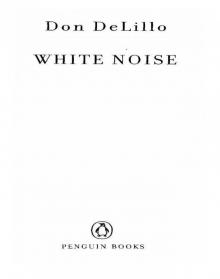 White Noise
White Noise Players
Players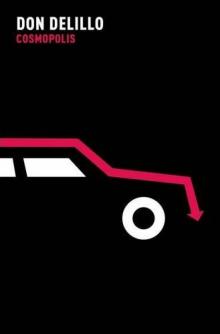 Cosmopolis
Cosmopolis The Silence
The Silence Mao II
Mao II Zero K
Zero K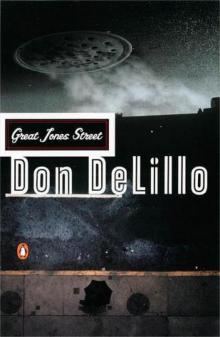 Great Jones Street
Great Jones Street The Angel Esmeralda
The Angel Esmeralda The Names
The Names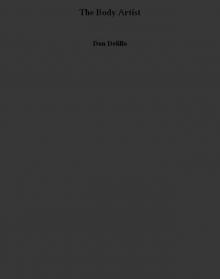 The Body Artist
The Body Artist Point Omega
Point Omega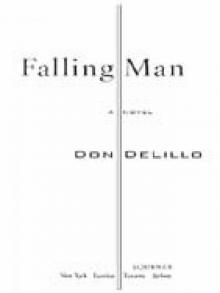 Falling Man
Falling Man